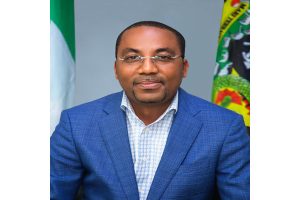…How He Earned His Place in Tinubu’s Renewed Hope Train
The circumstances under which Dr. Vincent Isegbe was reappointed as the Director-General (D-G) of the National Agricultural Quarantine Service (NAQS) is, perhaps, the best and latest proof that President Bola Ahmed Tinubu is a stickler for merit in making appointments.
Dr. Isegbe’s first 5-year tenure in that office had expired in December 2023 and an acting C-G had taken over control of affairs of NAQS. But before a substantive successor was named for the agency, a report was released by the Presidential Enabling Business Environment Council (PEBEC) which ranked NAQS in the top three agencies of the Federal Government of Nigeria in the efficiency and transparency index. An impressed President Tinubu did not hesitate to return Dr. Isegbe to NAQS to continue with his good work.

“The President expects that the Director-General will build on the Service’s recent performance after it ranked in the top three agencies of the Federal Government of Nigeria in the efficiency and transparency index by the Presidential Enabling Business Environment Council (PEBEC),” Ajuri Ngelale, the Presidential spokesman, said in the statement on Thursday, March 7, announcing Isegbe’s reappointment.
NAQS was established by the Nigeria Agricultural Quarantine Service (Establishment) Act 2018 as a full-fledged agency of government to promote and regulate sanitary and phytosanitary measures with respect to the export and import of plants, veterinary and aquatic resources.
The mandate of the Service is to ensure the conformance of Nigerian agricultural products to international standards –particularly, the requirements of the International Plant Protection Convention (IPPC) and the International Office of Epizootics –and to stimulate international trade in Nigerian agricultural products.
Former President Muhammadu Buhari appointed Dr. Isegbe as the pioneer Director-General of NAQS with effect from 13th December 2018 for an initial period of five years. He was charged with the responsibility of “institutionalizing the administrative and management structures requisite for operationalizing the paramilitary status of the agency.”
Isegbe hit the ground running. He led the Service to implement several key projects that have contributed significantly towards improving both production and exportation of agricultural commodities in the last five years. For instance, the agency introduced Biopesticide and integrated pest management programmes, the review of Biopesticide laws and regulations and the training of stakeholders on proper usage of Biopesticides.
The agency developed and enhanced 28 Export Certification Value Chains (ECVC) manuals for improved export and stakeholder awareness. It introduced management control measures to support farmers in the control and management of MLND and CBSD pest outbreaks. The Tuta Absoluta management and control programme in tomatoes, garden egg, etc, including the training of farmers on how to manage and control Tuta Absoluta on the vulnerable varieties, was also introduced.
Other innovations include the breeding/ranching programme for sustainable donkey hide export in which over 120 dealers on donkey ranching were trained; the development of animal disease-free areas and farms; the development and improvement of ornamental fish seedlings for export trade; analysis of Mycotoxins and heavy metals contaminants in animal products for export to enhance the confidence of trading partners and importing countries; and the BBTV control programme to support farmers in the control and management of Banana Bunchy Top Disease virus.
NAQS also embarked on awareness and sensitization campaign activities, including jingles in mainstream and new media, printing of posters/pamphlets in English, Pidgin and other local languages to further spread and enhance awareness and activities of the agency.

The agency embarked on Nationwide zero-reject advocacy to reduce the number of commodities being rejected at borders/states when exported; fruits and vegetable inspection and certification programme to enhance officers’ capacity for conformity assessment for export; establishment of SPS protocol for ECOWAS, EU, UK, US and Asian markets to enhance exportability of Nigerian agricultural commodities; awareness programme on the quarantine perspective of good agricultural practices; Army worm management and control programme in maize, sorghum, millet, etc; inspection, monitoring and certification of fish farms, facilities, water bodies, etc, to enhance the exportability of Nigerian aquatic products; and analysis of drug residues in animal products for export to enhance the confidence of trading partners and importing countries.
Projects executed in the area of construction, works and procurements include the architectural design of the proposed 6-storey NAQS Headquarters complex building, staff quarters, clinic, recreational facilities and demonstration farms.
The agency also equipped and renovated the Ibadan Training School conference hall with 100-seater state of-the-art auditorium and other facilities including the provision of 50KVA generators.
Other projects are the construction of two-storey laboratory building at Abuja and Lagos to facilitate the fulfillment of the agency’s mandate of inspection and certification; provision of Laboratory standards for Gas Chromatography at Ibadan Diagnostic Centre to enhance the research capabilities of the organization on methods to combat, control and prevent the spread of whitefly and other pests and disease incursions into Nigeria; office redesign and provision of sleek work stations and office equipment for efficient service delivery; and the construction of students hostels at the Ibadan Diagnostic Centre/Training School. These facilities were constructed to house officers of the quarantine service during training and other research functions.
Also executed were the construction of four units of one-bedroom building each at Idiroko, Calabar, Mfum and Imeko stations to provide office accommodation for quarantine operations at the various Control Posts; fencing of Illela, Lokoja, Maigatari, Makurdi and Idiroko Control Posts and construction of gate houses to further secure the assets of the agency; purchase of 24 Hilux vehicles and 10 Toyota Corolla vehicles for operational purposes at the zonal commands and headquarters; provision of equipment for linking NAQS with Nigeria Customs integrated information system to enhance trade facilitation activities and to support the ease of doing business programme of the government; provision of microchips for electronic identification of animals at ports and borders as well as the calibration instrumentation and training of officers.
Dr. Isegbe also equipped NAQS laboratory in Lagos and trained laboratory personnel in pursuit of ISO 17025 certification; developed and equipped Veterinary Quarantine stations at Illela and Makurdi to ensure effective and efficient sanitary inspection of animal and animal products at the inter-state control posts; and renovated Green/Screen houses in Ibadan Diagnostic Centre to meet the modern day demands of scientific accuracy and research precision.
The NAQS D-G also embarked on massive staff development, involving the training of quarantine officers on ACFTA and other export trade policy matters at the Trade Policy Training Centre in Africa (TRAPCA), Arusha, Tanzania; training of officers on laboratory management procedures in UK; and the training and retraining of officers on global SPS standards in Geneva.
He also ensured that IPPC/OIC/CODEX Meetings/Trade facilitation trainings were carried out to promote trade facilitation activities with trading partners and organizations; officers were involved in Cochran Fellowship training in the USA; NAQS officers were sent to the trade promotion programme for developing countries in Beijing China; and officers were sponsored for scholarship in postgraduate programme in University of Tsukuba, Japan.
Other activities of NAQS under Isegbe’s leadership are: the migration of staff from federal civil service commission to the NAOS paramilitary structure; engendering of the first NAQS promotion/Rank adjustment of 27 mid-level to senior officers; brokering of Phytosanitary protocol with the Chinese government for the establishment of sorghum farms for the export of sorghum to China; and the signing of a workplan with Mexico, sealing a deal for the export of millions of dollars worth of hibiscus export to Mexico and the Americas.
NAQS, under Isegbe’s leadership, hosted the World Congress of Regional Plant Protection Officers in Nigeria at Sheraton Hotel and Towers, Abuja, in 2019. It was the first by a National Plant Protection Organization (NAQS) in Africa.
As the Chief Executive Officer of NAQS, Dr. Isegbe has been churning out policies and programmes that make the Service stand out in the comity of sister agencies and international counterparts. He surely knows how to dig out the hidden treasures in NAQS’ human and material resources in such a way that it remains the agency to beat. He introduced the Service’s Annual Summit and Management Retreat where issues aimed at seeking better ways for effective and efficient service delivery in the agricultural value chain are discussed. The fourth edition took place in 2023.
It is little wonder that NAQS has been carting home awards and receiving accolades from within and outside Nigeria. It won the “Most Innovative Government Agency” award, by BusinessDay Media Ltd, for several crop surveys, the conduct of Pest Risk Analysis, amongst others; won 2nd position award for Outstanding Contributions to Nigeria’s Agricultural sector by National Agriculture Foundation of Nigeria during the World Food Day 2019 Agric Show; won the PEBEC 2018 Award-Most Improved Agency, second position on Transparency and Efficiency; and was voted the Most Improved Agency in the 5TH PEBEC Award, April 2023.
Dr. Isegebe earned his Doctor of Veterinary Medicine degree at Ahmadu Bello University, Zaria, in 1985 and his Master’s degree at the University of Maiduguri in 1990. Over the years, he has also undergone several training and courses within Nigeria and overseas. He is putting finishing touches to his PhD in International Agribusiness at Lead City University.
He began his career as a veterinary officer in the Federal Department of Livestock, Federal Ministry of Agriculture and Rural Development in 1989 and rose through the ranks to the position of Assistant Director before joining the NAQS as one of its pioneer staff in 2008. He was appointed NAQS pioneer Comptroller-General 10 years later following the signing into law of the Nigeria Agricultural Quarantine Service (Establishment) Bill 2018 which transformed the department into a full-fledged paramilitary agency.






